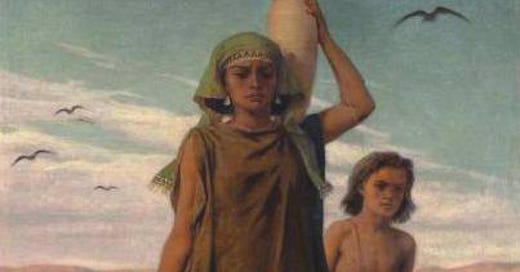Exploring the Unspoken: Hagar's Story.
No matter how we interpret this tale, the theme of slavery needs to be decried.
Image courtesy
The biblical "golden couple" group includes Abraham and Sarah. Their tale gives believers courage, hope, and faith. Most people never pause to address the themes of slavery, the "ethnic prejudice exacerbated by economic and social exploitation" (Renita J. Weems) in the same story.
Hagar was a black slave girl from Egypt. Her paternity is still in dispute. Some accounts say she was the daughter of the Pharaoh and others state that she was a slave in his palace. Whatever the case, she was given to a couple who was known then as Abram and Sarai. Word is that Sarai and her brother had come to Egypt to escape famine. Pharaoh had taken a liking to Sarai and taken her as a wife. One day Pharaoh had a dream and alas! Sarai was Abram’s wife! Not wanting to offend his god their god and all gods, he gave Abram back his wife and some livestock that included slaves. This is how Hagar found herself wandering the desert with this weird couple old couple with integrity issues. (They would lie about their relationship another time).
Hagar became Sarai’s handmaid. I assume this means she was pretty close to her and had front seats to all the shenanigans in the household.
Life went on fairly uneventfully until one night Abram appeared in her tent. He lay beside her and had his way with her. It was not uncommon for the master to sleep with slave girls. They were there partly for that reason. The slaves were the best alternative when their mistress was tired, ill, moody, or barren.
He returned to her tent a few more times before she began to feel unwell a few months later. She was pregnant. Hagar now moved a little slower because the morning sickness lasted all day. Sarai took it to mean laziness. After all, when did pregnancy become sickness? The mistress would be so cross if she found Hagar taking a nap or eating when it was not designated meal times. She was harsher towards Hagar instead of being a bit more lenient, considering that this slave girl was carrying the only heir known to them. It became too much for Sarai, so she blamed her husband for giving the slave better treatment now that Hagar was pregnant and she was not.
“The Lord will judge you!” she could be heard as she nagged her husband almost daily.
Abram fearing that the nagging would drive him mad told his wife that the slave was hers, and she could do with her as she pleased. That was the go-ahead Sarai needed.
One day when Hagar was attending to Sarai in her tent, she accidentally dropped a pot. Sarai gave her a beating that nearly killed her. The girl gathered up whatever strength she could master and fled the camp.
Later that evening Abram asked his wife where the slave girl was. “She ran away!”
Abram having known his wife for nearly a century decided not to stir the pot any further. There was no way the girl could have gone far he thought to himself.
She was pregnant, the desert soil was hot and in her haste, she had not carried any water. The next day in the morning, Abram set off to look for his property. He found Hagar not too far from the camp, delirious from fatigue and dehydration.
Hagar claimed that she had been visited by the angel of the Lord.
“You are now pregnant
and you will give birth to a son.
You shall name him Ishmael,[a]
for the Lord has heard of your misery.
12
He will be a wild donkey of a man;
his hand will be against everyone
and everyone’s hand against him,
and he will live in hostility
toward[b] all his brothers.”
I am baffled by these people who claim to have heard from the Lord or his angels and they did not ask any questions during their encounters. Hagar claimed that “The Lord had seen her” when he told her her son will be a wild donkey of a man! The curse goes on, that everyone will be against him. I do not know about anyone else, but I would have liked to reason with this Lord. But lest we forget, she was a black slave girl, she had already been conditioned not to expect anything good.
If I was writing this story or meeting the Lord, these would have been my points of contention:
Abram and Sarai were perpetual liars. They lied about their relationship. As a result, Sarai essentially had two affairs. They were not punished, instead, they got wealthier.
Sarai treated Hagar unfairly. Not once did the Lord mention it. Does the Lord condone slavery?
Hagar was nothing but faithful to her master and mistress. She even carried a child that was meant for them. (By the way, this is not the same as surrogacy.) What did she get out of it? Curses.
Since the 1970s, the custom has arisen of giving the name "Hagar" to newborn female babies. The giving of this name is often taken as a controversial political act, marking the parents as being supporters of reconciliation with the Palestinians and the Arab world, and is frowned upon by many, including nationalists and the religious. The connotations of the name were represented by the founding of the Israeli journal Hagar: Studies in Culture, Polity and Identities in 2000. Hagar. (2023, January 11). In Wikipedia. https://en.wikipedia.org/wiki/Hagar
So Hagar goes back, I am sure Abram told Sarai that the slave girl had seen the error in her ways and was ready to serve her mistress diligently.
And it came to pass, that Hagar gave birth to a son and gave him the name the Lord’s angel had commanded her to.
Abram went into some trance, again and when he came out of it, he decided his name was now Abraham and his wife’s, Sarah. He also said he had been told to cut off the foreskin of every male child or adult whether related to him or bought with his money.
One day three gentlemen came to visit. Abram was very excited, he slaughtered a calf, and brought out the milk and butter with the intention to impress. She heard him address them as ‘Lord’. I am telling you keeping up with this old couple was an extreme sport. One day they were praying to the air, the next day their god walked to their home and ate like them.
The Lords were on their way to Sodom and Gomorrah. Apparently, they had heard bad things about them. They were on their way to look for some holy people in that place that would give them reasons not to destroy the whole city.
As the men were preparing to leave, she and her mistress heard them tell Abraham that his wife would bear him a child. Now Hagar, being a slave girl did not react, she knew her place was to be seen and not heard. Sarah on the other hand scoffed and shook her head.
Sarah did get pregnant and gave birth to the long-awaited male child. Isaac. When he was weaned, they had a big celebration. Nothing was done when Ishmael was weaned.
Sarah was worried that Ishmael would share in the inheritance. This can only mean that Abraham was a fair man. But he was also weak and fearful of confrontation. Sarah asked him to banish the slave girl and her son. Her reason was flimsy. Abraham was troubled but the Lord sided with Sarah.
The next day, Abraham gave Hagar and her son some bread and a bottle of water and sent them away. Into the desert. Abraham sent Hagar and his firstborn son Ishmael to the desert to die. He did not give them any livestock or even a tent. Just some bread and water.
Hagar and her son wandered off into the desert. As a woman with children, I wonder what was in Hagar’s mind concerning their future. There is no record of resistance when she was ‘sent away’. Had she accepted her fate as a slave girl? That her life meant nothing. That her years of service to the master and his mistress boiled down to a piece of bread and water. He could not even give her a donkey. Abraham was very wealthy.
It is said she and her son survived in the desert, and she even got Ishmael a wife from Egypt. Imagine as an adult what it must have been like for a woman to raise her son in the desert for years. The African women's tenacity. Hagar underwent more suffering than any other female character in the Bible.
No matter how we interpret this tale, the theme of slavery needs to be decried. The adverse effects of slavery and colonisation persist today. It is diabolical to attempt to draw faith-based lessons from a tale of human suffering, especially when those tales were employed to coerce our ancestors into tolerating abuse.
Some Jewish commentators identify Hagar with Keturah (Imperial Aramaic: קְטוּרָה, romanized: Qəṭurɔh), the woman Abraham married after the death of Sarah, stating that Abraham sought her out after Sarah's death. It is suggested that Keturah was Hagar's personal name, and that "Hagar" was a descriptive label meaning "stranger". Hagar. (2023, January 11). In Wikipedia. https://en.wikipedia.org/wiki/Hagar
There is a narrative that says Hagar, which means ‘stranger’ was called Keturah and that she remained ‘chaste’ after Abraham’s baby, Ishmael. After Sarah died, Abraham married Hagar/Keturah. It might be a wonderful love story only it is not. Hagar/ Keturah was a black slave, living in the wilderness. Her first and only child was a result of rape. As property of her master, there was no way she had a choice in that union and he was probably the only man she ever knew. She probably took Abraham in after the death of his wife because she still had the mindset of a slave. Perhaps this is why we continue to pray to the God of Abraham







I see comnents here drawn from the tales in the bible which are tailored to make us accept servitude and slavery. Any keen person should be able to tell that the writer has drawn her content elsewhere other than from the bible. I am also aware that Abraham did later on go to seek Ishmael once he had grown up to around 16 years of age. Iam glad the writer has asked questions that i have always asked myself and more. What god is this that condones slavery of fellow human beings?
Forgot to mention... Hagar provoked Sarai. Gen 16:4 she despised Sarai because she conceived yet Sarai had not after many many years of marriage. Jacob's #2 (Rachel) was not able to concieve for a while yet Bilhah (her maidservant who bore Naphtali and Dan) did not vilify her.